-
11-10-2023
Time to act sustainably: Why can’t we wait any longer?
Revista Brasileira de Enfermagem. 2023;76(5):e20220813
Abstract
Time to act sustainably: Why can’t we wait any longer?
Revista Brasileira de Enfermagem. 2023;76(5):e20220813
DOI 10.1590/0034-7167-2022-0813
Views0See moreABSTRACT
Objectives:
to raise reflections on the need for health services and professionals to implement sustainable actions, aiming at their own survival and that of the planet.
Methods:
reflective essay based on international reports regarding the impact of climate change on people’s health and the role of institutions in this context.
Results:
the article focused on three fundamentals: climate change continues to be a threat to the health and well-being of all beings on Earth; the institutions that should contribute to health are great agents of contamination of the environment and emission of gases that aggravate the greenhouse effect; and there are several benefits for health institutions to act sustainably.
Final Considerations:
we cannot wait any longer; we must develop policies and management models aimed at environmentally responsible, economically viable, and socially more collaborative healthcare.
-
REVIEW11-10-2023
Applying Lean Healthcare in the hospitalization and patient discharge process: an integrative review
Revista Brasileira de Enfermagem. 2023;76(5):e20220751
Abstract
REVIEWApplying Lean Healthcare in the hospitalization and patient discharge process: an integrative review
Revista Brasileira de Enfermagem. 2023;76(5):e20220751
DOI 10.1590/0034-7167-2022-0751
Views0See moreABSTRACT
Objectives:
to identify scientific evidence regarding the use of Lean Healthcare approach in the hospitalization and patient discharge process.
Methods:
this is an Integrative Review conducted in the PubMed, LILACS, SCOPUS, CINAHL, Web of Science, and Embase databases.
Results:
out of 904 records identified, three were included in this review. The studies demonstrated that when applied to discharge planning, the Lean philosophy brings favorable results, promoting improvements in the communication process, as well as assisting in workflow organization, with a reduction in length of stay and improvement in the quality of care.
Final Considerations:
although the Lean methodology presents positive results, it is considered that the application of the philosophy in healthcare institutions is still not sustainable, as it is often restricted to specific departments or services. Thus, to maximize the success of implementation, the Lean philosophy needs to be incorporated into the organizational culture, representing the greatest challenge.
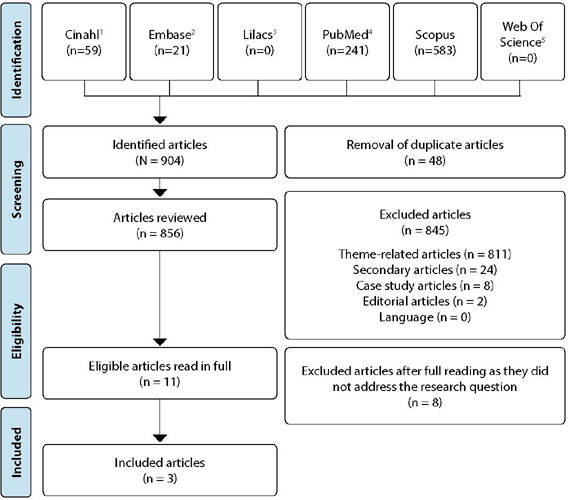
-
11-10-2023
A eficácia do uso de livros interativos multimodalidade em enfermagem pediátrica na implementação do programa Merdeka Belajar
Revista Brasileira de Enfermagem. 2023;76(5):e20220599
Abstract
A eficácia do uso de livros interativos multimodalidade em enfermagem pediátrica na implementação do programa Merdeka Belajar
Revista Brasileira de Enfermagem. 2023;76(5):e20220599
DOI 10.1590/0034-7167-2022-0599
Views0See moreRESUMEN
Objetivos:
analizar la efectividad del uso de libros interactivos multimodales en enfermería pediátrica sobre los resultados de aprendizaje de los estudiantes en la implementación del Programa Merdeka Belajar.
Métodos:
investigación cuasi-experimental con un diseño de grupo de control posterior a la prueba. En este estudio, la muestra incluyó 52 estudiantes de enfermería del cuarto semestre del Instituto de Ciencias de la Salud Suaka Insan Banjarmasin que recibieron el curso de Enfermería Pediátrica. Fue utilizada la técnica de muestreo total y la prueba t dependiente en el análisis de datos.
Resultados:
el libro interactivo multimodal de enfermería pediátrica fue efectivo en la mejora del logro de aprendizaje de los estudiantes de cuarto semestre con un valor de significancia de 0,015 < 0,05. Hay una diferencia en el valor promedio de los cursos de enfermería pediátrica para la clase A y la clase B, que es de 3,173.
Conclusiones:
el uso de libros multimodales interactivos es muy bueno para que los profesores los apliquen en la enseñanza para ayudar a los estudiantes a comprender el material que están aprendiendo.
-
11-10-2023
ERRATA
Revista Brasileira de Enfermagem. 2023;76(5):e2023n5e04
Abstract
ERRATA
Revista Brasileira de Enfermagem. 2023;76(5):e2023n5e04
DOI 10.1590/0034-7167.20237605e04pt
Views0No artigo “Primeira graduada do Mestrado em Enfermagem em Prática Avançada em Oncologia no Chile”, com número DOI: , publicado no periódico Revista Brasileira de Enfermagem, 2023; 2023(Suppl 4):e76suppl401, no segundo parágrafo:Onde se lia:[…]See more -
ORIGINAL ARTICLE11-10-2023
The effectiveness of using interactive multimodality books in pediatric nursing in implementing Merdeka Belajar program
Revista Brasileira de Enfermagem. 2023;76(5):e20220599
Abstract
ORIGINAL ARTICLEThe effectiveness of using interactive multimodality books in pediatric nursing in implementing Merdeka Belajar program
Revista Brasileira de Enfermagem. 2023;76(5):e20220599
DOI 10.1590/0034-7167-2022-0599
Views0See moreABSTRACT
Objectives:
to analyzing the Effectiveness of Using Interactive Multimodality Books in Pediatric Nursing on Student Learning Outcomes in Implementing the Merdeka Belajar Program.
Methods:
the research design used a quasi-experimental approach with a posttest control group design. The sample in this study was the fourth-semester nursing students of Institute of Health Science Suaka Insan Banjarmasin who received the Pediatric Nursing course, a total of 52 students. The sampling technique used is total sampling. Data analysis used the dependent t-test.
Results:
the interactive multimodality pediatric nursing book was effective in improving the learning achievement of fourth-semester students with a significance value of 0.015 < 0.05. There is a difference in the average value of pediatric nursing courses for class A and class B, which is 3.173.
Conclusions:
the use of interactive multimodality books is very good for lecturers to apply in teaching to help students understand the material they are learning.
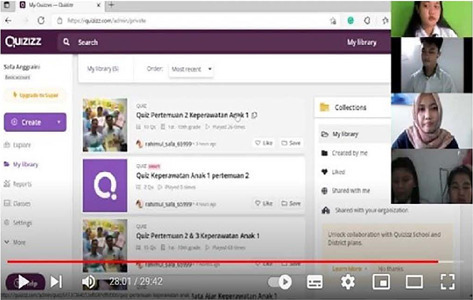
-
ERRATUM11-10-2023
ERRATUM
Revista Brasileira de Enfermagem. 2023;76(4):e2023n4e03
Abstract
ERRATUMERRATUM
Revista Brasileira de Enfermagem. 2023;76(4):e2023n4e03
DOI 10.1590/0034-7167.20237604e03
Views0In the article “Diabetic foot ulcer self-care assessment: a scoping review”, with DOI number: https://doi.org/10.1590/0034-7167-2022-0555, published in Revista Brasileira de Enfermagem, 2023;76(3): e20220555, in the title:Where it read:[…]See more -
ORIGINAL ARTICLE11-10-2023
Validation of the Advanced Practice Nursing Competency Assessment Instrument in a hospital environment
Revista Brasileira de Enfermagem. 2023;76:e20220705
Abstract
ORIGINAL ARTICLEValidation of the Advanced Practice Nursing Competency Assessment Instrument in a hospital environment
Revista Brasileira de Enfermagem. 2023;76:e20220705
DOI 10.1590/0034-7167-2022-0705
Views0See moreABSTRACT
Objectives:
to evaluate the measurement properties of the Advanced Practice Nursing Competency Assessment Instrument – Brazilian version, in the hospital environment.
Methods:
a methodological study conducted in a hospital with 238 nurses. Three instruments collect the data: sample characterization form, Brazilian version of the Advanced Practice Nursing Competency Assessment Instrument, and the category “therapeutic interventions” of the nurse competence scale. Construct validity was verified by confirmatory factor analysis and Spearman’s correlation coefficient, and reliability by Cronbach’s Alpha and composite reliability.
Results:
in the factor analysis, the model converged to a satisfactory result. The study found acceptable evidence of reliability (Cronbach’s Alpha, 0.76-0.87; and composite reliability, 0.85-0.90).
Conclusions:
the instrument demonstrated evidence of construct validity and internal consistency and can be used in practice
-
11-10-2023
Technology for the treatment promotion of adults living with HIV: Positive o Cuidado (Positive the Care)
Revista Brasileira de Enfermagem. 2023;76:e20220454
Abstract
Technology for the treatment promotion of adults living with HIV: Positive o Cuidado (Positive the Care)
Revista Brasileira de Enfermagem. 2023;76:e20220454
DOI 10.1590/0034-7167-2022-0454
Views0See moreABSTRACT
Objectives:
to develop a responsive website focused on treatment adherence for adult users living with HIV.
Methods:
technological study conducted between August and October 2020, in the light of Pierre Lévy’s theoretical-philosophical framework, using the Double Diamond Process methodology associated with the five stages of The Elements of User Experience framework.
Results:
it was developed the responsive website Positive Care (Positive o Cuidado), composed of an initial presentation screen and 13 other screens named: Family Health and You; Undetectable = Untransmissible; Antiretroviral Drugs; Routine Tests; Vaccination; Antiretroviral Delivery; Drug Interactions; Combined Prevention; Support Services; Healthy Life; Family and Reproductive Planning; Covid 19; and Questions, Curiosities, and Myths.
Final Considerations:
the responsive website was developed based on the software design and programming process and has requirements/functionalities with the potential to strengthen the collective intelligence about HIV and, consequently, to promote treatment adherence by its users.
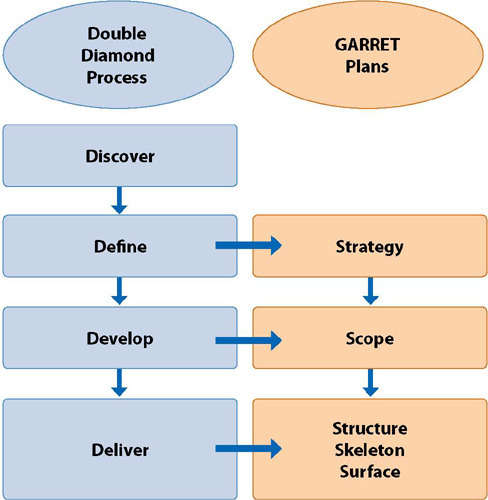
-
06-01-2015
Health promotion in supplementary health care: outsourcing, microregulation and implications for care
Revista Brasileira de Enfermagem. 2015;68(3):482-489
Abstract
Health promotion in supplementary health care: outsourcing, microregulation and implications for care
Revista Brasileira de Enfermagem. 2015;68(3):482-489
DOI 10.1590/0034-7167.2015680315i
Views1See moreABSTRACT
Objective:
to analyze health promotion programs in the supplementary health care.
Methods:
This was a multiple case study with a qualitative approach whose data were obtained from interviews with coordinators of providers contracted by the corporations of health insurance plans in Belo Horizonte, Minas Gerais. The data were submitted to Critical Discourse Analysis.
Results:
Home care has been described as the main action in the fi eld of health promotion transferred to the providers, followed by management of patients and cases, and the health education.groups. The existence of health promotion principles is questionable in all programs. Outsourcing is marked by a process with a division between cost and care management. Implications of this process occur within admission and interventions on the needs of the benefi ciaries.
Conclusions:
Statements revealed rationalization of cost, restructuring of work, and reproduction of the dominant logic of capital accumulation by the health insurance companies.

-
ORIGINAL ARTICLE01-01-2019
Knowledge and behavior of professionals about bundled strategies of central venous catheter
Revista Brasileira de Enfermagem. 2019;72(1):50-56
Abstract
ORIGINAL ARTICLEKnowledge and behavior of professionals about bundled strategies of central venous catheter
Revista Brasileira de Enfermagem. 2019;72(1):50-56
DOI 10.1590/0034-7167-2018-0164
Views1See moreABSTRACT
Objective:
To investigate the factors that influence the knowledge and behavior of professionals of neonatal and pediatric units about bundled strategies of insertion of central venous catheter.
Method:
This is a cross-sectional study, conducted in one neonatal and one pediatric intensive care units in a public hospital in Belo Horizonte, Brazil, from April to July, 2016. The sample consisted of 255 professionals who answered a structured instrument. Descriptive and comparative analyses were made using the SPSS software.
Results:
The category nursing professional (p = 0.010), working hours of 12×36 scale (p < 0.001), training as a form of acquiring knowledge (p < 0.001) and participation in training programs (p < 0.001) are associated to greater knowledge about the bundle. Regarding behavior, no significant associations were observed.
Conclusion:
The study showed that there are factors that influence the knowledge about bundled strategies of insertion of central venous catheter, reflecting the need to consider these practices for making more effective educational practices in health care.
-
ORIGINAL ARTICLE12-13-2019
Factors associated with low Apgar in newborns in birth center
Revista Brasileira de Enfermagem. 2019;72:297-304
Abstract
ORIGINAL ARTICLEFactors associated with low Apgar in newborns in birth center
Revista Brasileira de Enfermagem. 2019;72:297-304
DOI 10.1590/0034-7167-2018-0924
Views1See moreABSTRACT
Objective:
to analyze factors associated with Apgar of 5 minutes less than 7 of newborns of women selected for care at the Center for Normal Birth (ANC).
Method:
a descriptive cross-sectional study with data from 9,135 newborns collected between July 2001 and December 2012. The analysis used absolute and relative frequency frequencies and bivariate analysis using Pearson’s chi-square test or the exact Fisher.
Results:
fifty-three newborns (0.6%) had Apgar less than 7 in the 5th minute. The multivariate analysis found a positive association between low Apgar and gestational age less than 37 weeks, gestational pathologies and intercurrences in labor. The presence of the companion was a protective factor.
Conclusion:
the Normal Birth Center is a viable option for newborns of low risk women as long as the protocol for screening low-risk women is followed.
-
ORIGINAL ARTICLE04-09-2020
Factors associated with the discontinuance of outpatient follow-up in neonatal units
Revista Brasileira de Enfermagem. 2020;73(3):e20180793
Abstract
ORIGINAL ARTICLEFactors associated with the discontinuance of outpatient follow-up in neonatal units
Revista Brasileira de Enfermagem. 2020;73(3):e20180793
DOI 10.1590/0034-7167-2018-0793
Views1See moreABSTRACT
Objectives:
to identify predisposing and enabling factors as well as the health needs associated with the discontinuance of outpatient follow-up of newborns who were hospitalized at neonatal intensive care unit.
Methods:
cross-sectional study, using the behavioral model of health services use. The study was composed of 358 mothers and newborns referred to the outpatient follow-up after discharge. Characterization, perception of social support, postnatal depression, and attendance to appointments data were collected, analyzed by the R software (3.3.1).
Results:
outpatient follow-up was discontinued by 31.28% of children in the first year after discharge. In multiple regression analysis, the chance of discontinuance was higher for newborns who used mechanical ventilation (OR = 1.68; 95%CI 1.04-2.72) and depended on technology (OR = 3.54; 95%CI 1.32-9.5).
Conclusions:
predisposing factors were associated with the discontinuance of follow-up; enabling factors and health needs did not present a significant association. Children with more complex health conditions require additional support to participate in follow-up programs, thus ensuring the continuity of care.

-
ORIGINAL ARTICLE02-22-2021
Analysis of vaccine loss due to temperature change
Revista Brasileira de Enfermagem. 2021;74(1):e20190762
Abstract
ORIGINAL ARTICLEAnalysis of vaccine loss due to temperature change
Revista Brasileira de Enfermagem. 2021;74(1):e20190762
DOI 10.1590/0034-7167-2019-0762
Views1See moreABSTRACT
Objectives:
to analyze vaccine losses in a Health Region in the Northwest of São Paulo.
Methods:
retrospective cross-sectional study with secondary data obtained from Temperature Change Notification Forms used by the Epidemiological Surveillance Group XXIX of São José do Rio Preto between 2010 and 2017. Descriptive and inferential analysis were performed using multiple linear regression and significance level of 95%.
Results:
in total, 341 notifications of temperature changes were analyzed, of which 70.1% were caused by structural reasons, 57.8% in industrial refrigerators and 91.2% in primary care services. Of the doses that suffered a change in temperature, 41.4% were lost and 58.6% were administered to the population. The highest percentage of lost doses compared to those applied occurred in smaller municipalities, although they reported less.
Conclusions:
nursing workers who work in vaccination rooms should make efforts to prevent temperature changes and avoid losses and higher public expenses.
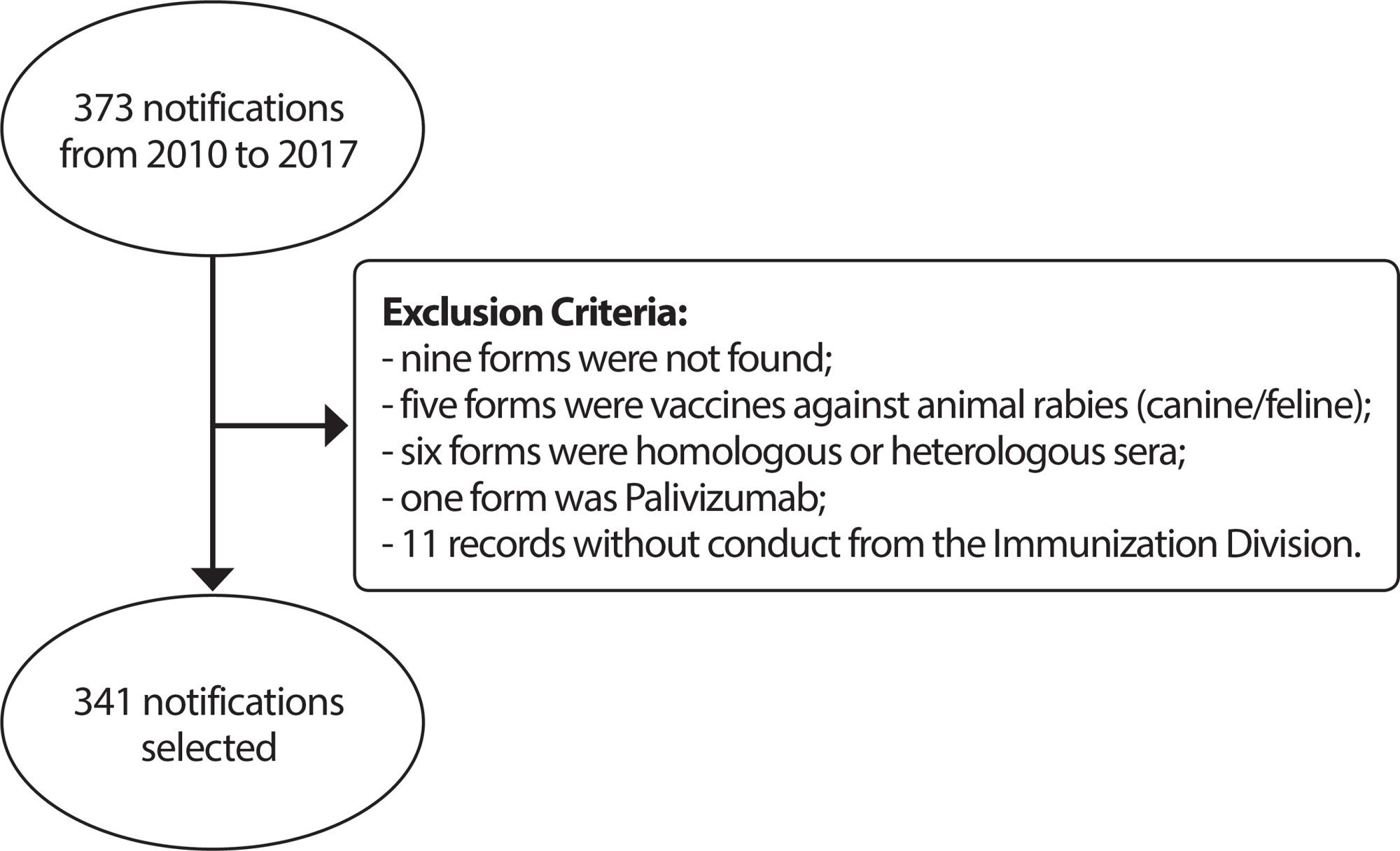
-
ORIGINAL ARTICLE09-26-2022
Participatory development of educational technology in seeking patient safety in maternity hospitals
Revista Brasileira de Enfermagem. 2022;75(5):e20210701
Abstract
ORIGINAL ARTICLEParticipatory development of educational technology in seeking patient safety in maternity hospitals
Revista Brasileira de Enfermagem. 2022;75(5):e20210701
DOI 10.1590/0034-7167-2021-0701
Views1See moreABSTRACT
Objectives:
to develop a booklet as an educational technology, together with health professionals, patients and companions, aiming at their involvement in patient safety in maternity hospitals.
Methods:
a qualitative convergent care study, carried out in three stages at a maternity hospital in Belo Horizonte. The booklet construction took place between February and April 2021, with 13 professionals, 06 companions and 11 patients.
Results:
data content analysis was performed, creating three categories: Knowledge and experiences about patient and newborn safety in maternity hospitals; Challenges for involving patient and companion in safety actions; Assessment of patients, companions and professionals on the booklet construction process. The booklet construction involved the participation of health professionals, users and companions in all stages of the process.
Final considerations:
the participatory process enabled the creation of educational technology for the involvement of patients and companions in patient safety actions.
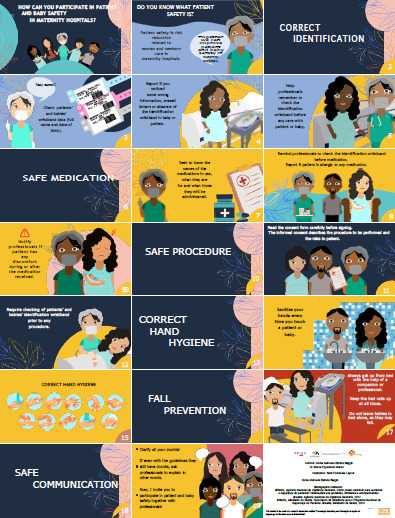
-
12-08-2023
Nursing experiences in specialized services in child and adolescent mental health: a systematic review of qualitative studies
Revista Brasileira de Enfermagem. 2023;76:e20220550
Abstract
Nursing experiences in specialized services in child and adolescent mental health: a systematic review of qualitative studies
Revista Brasileira de Enfermagem. 2023;76:e20220550
DOI 10.1590/0034-7167-2022-0550
Views1See moreABSTRACT
Objective:
to synthesize evidence from qualitative studies on nursing experiences regarding child and adolescent mental health care in specialized services.
Method:
a systematic review with meta-synthesis of qualitative studies according to JBI guidelines. CINAHL, EMBASE, MEDLINE, LILACS, PSYCinfo, Scopus and Web of Science databases were used. The findings were classified according to the level of reliability and credibility and categorized by similarity between contents.
Results:
229 articles were identified, and five were included in the final sample and organized into the categories: Emotional impact; and Understanding nursing role. The level of evidence found was moderate.
Final considerations:
nursing experiences are permeated by emotional exhaustion, feelings of frustration and difficulty in understanding their professional role. The need for training spaces that qualify this care is highlighted.

-
ORIGINAL ARTICLE07-19-2024
Validation of an instrument for assessing leprosy care in children and adolescents
Revista Brasileira de Enfermagem. 2024;77(2):e20230344
Abstract
ORIGINAL ARTICLEValidation of an instrument for assessing leprosy care in children and adolescents
Revista Brasileira de Enfermagem. 2024;77(2):e20230344
DOI 10.1590/0034-7167-2023-0344
Views1See moreABSTRACT
Objectives:
to validate the content of an instrument for assessing leprosy care in individuals under 15 years old in the context of Primary Health Care.
Methods:
methodological study of content validation, based on the evaluation of essential and derived attributes in primary care, in the professional version. For data analysis, the Content Validation Index (CVI ≥ 0.8) and Cronbach’s Alpha were calculated.
Results:
a higher percentage of judges among nurses (61.5%) was observed; with a doctorate (46.2%), and engaged in teaching and research (77%). The overall Content Validation Index of the instrument was 0.98. In the analysis of Cronbach’s Alpha of the instrument, the assigned value was 0.717.
Conclusions:
the instrument represents an advancement in the measurement of health evaluation policies and can significantly contribute to improving the quality of care provided to children and adolescents with leprosy.
-
ORIGINAL ARTICLE06-27-2019
Validation of a clinical simulation setting in the management of postpartum haemorrhage
Revista Brasileira de Enfermagem. 2019;72(3):624-631
Abstract
ORIGINAL ARTICLEValidation of a clinical simulation setting in the management of postpartum haemorrhage
Revista Brasileira de Enfermagem. 2019;72(3):624-631
DOI 10.1590/0034-7167-2018-0065
Views0See moreABSTRACT
Objective:
To construct and validate a clinical simulation setting for postpartum haemorrhage.
Method:
Quantitative research of methodological development, carried out from May to July of 2016 with 22 expert judges and 30 students. Analysis was performed from descriptive statistics, Binomial Test and Content Validity Index (CVI), considering CVI ≥ 80%.
Results:
Setting construction was based on learning objectives, fidelity, evaluation tool, pre-setting activities and debriefing. Agreement, regarding its validity, was satisfactory in the 23 items analyzed. Items evaluated by judges had CVI> 0.90; in the evaluation by students, CVI was > 0.95.
Conclusion:
It was considered validated and suitable for training and use by nursing students. Other studies should be carried out in order to test its effectiveness in the construction of theoretical and practical knowledge of both nursing students and nurses during Permanent Education.
-
REVIEW06-01-2020
Access of the black population to health services: integrative review
Revista Brasileira de Enfermagem. 2020;73(4):e20180834
Abstract
REVIEWAccess of the black population to health services: integrative review
Revista Brasileira de Enfermagem. 2020;73(4):e20180834
DOI 10.1590/0034-7167-2018-0834
Views1See moreABSTRACT
Objectives:
demonstrate and discuss how the black population’s access to health services occurs
Methods:
integrative literature review with the following question: How does the black population’s access to health services occur? The search was carried out in the Scholar, LILACS and SciELO databases and used the descriptor “access to health services” and the term “population,” resulting in a sample with twelve articles.
Results:
studies show that the difficulty of access is a fundamental factor for the quality of life of people, directly compromising preventive services, especially for women’s health and, in addition, it has significant impact on the illness process of the black population within its particularities.
Final Considerations:
several limiting factors compromise the black population’s access to health services, including institutional and structural factors

-
ORIGINAL ARTICLE10-21-2019
Occupational stress and engagement in primary health care workers
Revista Brasileira de Enfermagem. 2019;72(6):1580-1587
Abstract
ORIGINAL ARTICLEOccupational stress and engagement in primary health care workers
Revista Brasileira de Enfermagem. 2019;72(6):1580-1587
DOI 10.1590/0034-7167-2018-0681
Views0See moreABSTRACT
Objective:
To evaluate levels of occupational stress and work engagement among primary health care workers.
Method:
A descriptive, correlational and transversal study was carried out in a small municipality in the countryside of São Paulo, with a non-probabilistic sample of convenience, with 85 workers. Three self-applied instruments were used: one developed by researchers, containing sociodemographic variables; Work Stress Scale (WSS) and Utrech Work Engagement Scale (UWES).
Results:
Prevalence of women (72.6%), 40 years old or more (45.9%), 4 years and 4 months of mean working time in primary care. Thirty-one workers (36.5%) presented significant stress (scores ≥2.5). Work engagement showed a mean of 4.1 (±1.2) to 4.4 (±1.4), classified as high in all dimensions. Occupational stress and work engagement correlated negatively.
Conclusion:
Workers presented high levels of work engagement; more than one-third had significant occupational stress. Workers with high levels of occupational stress tend to have lower work engagement.
-
ORIGINAL ARTICLE07-01-2020
Patient safety culture: perception of nursing professionals in high complexity institutions
Revista Brasileira de Enfermagem. 2020;73(5):e20190174
Abstract
ORIGINAL ARTICLEPatient safety culture: perception of nursing professionals in high complexity institutions
Revista Brasileira de Enfermagem. 2020;73(5):e20190174
DOI 10.1590/0034-7167-2019-0174
Views1See moreABSTRACT
Objectives:
to analyze the perception of nursing professionals about patient safety culture in three highly complex hospital institutions.
Methods:
descriptive and quantitative study with professionals working in care. The Hospital Survey on Patient Safety Culture questionnaire was applied, classifying its dimensions according to the percentage of positive responses (strengthened: ≥75.0%; potential for improvement: <75.0% to> 50.0%; weakened: ≤50.0%).
Results:
four hundred sixty-seven professionals (79.6%), mostly women (88.4%), nursing technicians/assistants (57.2%), 20 to 39 years (60.8%), less than five years in the institution (57.8%) and exclusive bond (79.2%) participated in the study. Safety culture was considered fragile, seven dimensions assessed as such, highlighting “Openness to communication” and “Non-punitive responses to errors” with <30.0% positive responses.
Conclusions:
evidence of the need for discussion of the subject and strategies for change that promote quality and safety of care.

-
ORIGINAL ARTICLE06-27-2019
Debriefing evaluation in nursing clinical simulation: a cross-sectional study
Revista Brasileira de Enfermagem. 2019;72(3):788-794
Abstract
ORIGINAL ARTICLEDebriefing evaluation in nursing clinical simulation: a cross-sectional study
Revista Brasileira de Enfermagem. 2019;72(3):788-794
DOI 10.1590/0034-7167-2018-0103
Views0See moreABSTRACT
Objective:
Evaluate the contribution of debriefing after clinical simulations for nursing students.
Method:
Quantitative study, conducted with 35 nursing students who participated in five clinical simulation scenarios with planned debriefings based on the model of the National League Nursing/Jeffries Simulation Theory. After the fifth scenario, students answered the Debriefing Evaluation Scale associated with the Simulation.
Results:
The items evaluated involved the psychosocial, cognitive, and affective values, and within a scale from one to five, the highest mean was found in cognitive value with 4.23 (±0.56) points, then in psychosocial value with 3.77 (±0.53), and finally in affective value with 3.71 (±0.63) points.
Conclusion:
The debriefing conducted after the clinical simulation scenarios was a reflective exercise that contributed to the student integrating multiple knowledges in affective, cognitive and psychosocial values, and thus develop the competencies required.
-
REVIEW11-06-2020
Transitional care to caregivers of dependent older people: an integrative literature review
Revista Brasileira de Enfermagem. 2020;73:e20200394
Abstract
REVIEWTransitional care to caregivers of dependent older people: an integrative literature review
Revista Brasileira de Enfermagem. 2020;73:e20200394
DOI 10.1590/0034-7167-2020-0394
Views1See moreABSTRACT
Objective:
To identify the needs of caregivers of dependent older people related to self-care in the transition from hospital to home.
Methods:
Integrative literature review that followed a predefined protocol, carried out from March to May 2019 in the platforms EBSCO, B-On, Scopus, Web of Science, and Joanna Briggs Institute. Descriptors and eligibility criteria were defined for the bibliographic sample, which was ten articles. The search was limited to articles published between 2015 and 2019 to guarantee evidence topicality.
Results:
The needs of caregivers related to transitional care can be grouped into five categories: needs in the transition into the role of caregiver; needs related to self-care of caregivers themselves; health needs; economic needs; and social and collective needs.
Final considerations:
The work developed by nurses regarding transitional care of caregivers must have two focuses: managing care provided to dependent older people and managing the needs of caregivers and the care offered to them.

-
REVIEW10-19-2020
Validation methods of nursing protocols: an integrative review
Revista Brasileira de Enfermagem. 2020;73:e20200050
Abstract
REVIEWValidation methods of nursing protocols: an integrative review
Revista Brasileira de Enfermagem. 2020;73:e20200050
DOI 10.1590/0034-7167-2020-0050
Views0See moreABSTRACT
Objective:
to identify scientific production about validation methods of nursing care protocols.
Method:
an integrative review with search at Scielo, Pubmed/MEDLINE, Virtual Health Library, Web of Science, Scopus, and EBSCOhost. The descriptors “validation studies”, “validation studies as topic”, “protocols”, “clinical protocols”, “practice guidelines as topic”, “nursing” and “nursing assessment” and the uncontrolled descriptor “validation” were used.
Results:
thirty-two articles were selected, most of them Brazilian. Content validation by experts was the most frequent method, with no consensus on the number of participants for the process. The collection instruments were mostly created by the authors. Data analysis was performed using descriptive statistics and Content Validity Index, with a variable consensus rate in the analyzed articles.
Conclusion:
protocols validated by experts are robust tools for use in clinical practice, with methodological rigor in development essential for its quality.

-
EXPERIENCE REPORT04-09-2020
Implementation of an Artificial Intelligence Algorithm for sepsis detection
Revista Brasileira de Enfermagem. 2020;73(3):e20180421
Abstract
EXPERIENCE REPORTImplementation of an Artificial Intelligence Algorithm for sepsis detection
Revista Brasileira de Enfermagem. 2020;73(3):e20180421
DOI 10.1590/0034-7167-2018-0421
Views0See moreABSTRACT
Objectives:
to present the nurses’ experience with technological tools to support the early identification of sepsis.
Methods:
experience report before and after the implementation of artificial intelligence algorithms in the clinical practice of a philanthropic hospital, in the first half of 2018.
Results:
describe the motivation for the creation and use of the algorithm; the role of the nurse in the development and implementation of this technology and its effects on the nursing work process.
Final Considerations:
technological innovations need to contribute to the improvement of professional practices in health. Thus, nurses must recognize their role in all stages of this process, in order to guarantee safe, effective and patient-centered care. In the case presented, the participation of the nurses in the technology incorporation process enables a rapid decision-making in the early identification of sepsis.
Search
Search in:
Nuvem de Tags
Adolescente (85) Atenção Primária à Saúde (239) COVID-19 (91) Criança (91) Cuidados de Enfermagem (269) Educação em Enfermagem (151) Educação em Saúde (139) Enfermagem (930) Enfermagem Pediátrica (86) Estudantes de Enfermagem (77) Estudos de Validação (131) Família (87) Idoso (208) Promoção da Saúde (99) Qualidade de Vida (104) Saúde do Trabalhador (86) Saúde Mental (145) Saúde Pública (82) Segurança do Paciente (150) Tecnologia Educacional (100)



